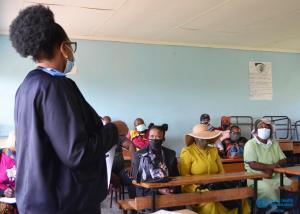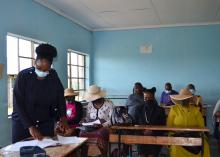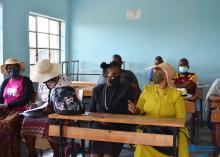Optimizing vaccine uptake through training teachers and school boards
After two years of crippling with COVID-19 pandemic, the introduction of vaccines had shown the light into a better future, a better future for the economy, social life and academic life of every country.
Schools were highly disrupted by the pandemic totally closing for over a year and for some introducing online learning, a struggle for many students and teachers. With the introduction of the Pfizer vaccine, eligible for 12 to 17 year olds massive hope for the full-time schooling of children is evident. The Ministry of Education in Lesotho is directing maximum effort to ensure that every student receives high-quality education, while working to safeguard the health, safety, and well-being of students, families, teachers, and staff.
Thabiso Motšoeneng, 14 years old, is one of a few young people who decided without hesitation to take the Pfizer COVID-19 vaccine in December 2021. He has only started his secondary school but does not stop to express his love for science, with great emphasis on the current COVID-19 pandemic.
“I have been reading a lot of articles online about the pandemic during the long unfortunate break we had and I think out of all the health articles I have seen and news I have heard; the discovery of the vaccine was the best news for me” he says.
Thabiso’s mother, ‘Mathabiso Motšoeneng introduced us to his son during the Lesotho Red Cross COVID-19 awareness workshop for Kolojane Primary School teachers and school board members. The activity, financially supported by WHO Lesotho with funding from Canada, aims to strengthen health systems in Lesotho through the Access to COVID-19 Tools Accelerator(ACT-A) programme.
‘Mathabiso says she had her doubts with the vaccine especially when targeted to children, “I had side effects that were moderate, headache, weakness and numbness and I was afraid it could get worse for myself but he told me he had taken the first shot and didn’t have any side-effects, I realized we are all different and respond differently to vaccine”.
Mathabiso is a member of the Kolojane primary school board who received a teaching on COVID-19 and COVID-19 vaccines and how they work, what each participant’s role is in advocating for vaccine and increase demand in their different circles, “we learned so much about vaccines and how they work, now that we are knowledgeable we will pass what we have to our communities and children”.
Tšita Maqatsa , a nurse at Kolojane Health Centre, says prior to the activities, the vaccine uptake for 12 to 17 year olds was very low but after reaching out to two schools in the area, the uptake started to increase, “it dawned on us that people wanted to receive education for them to take informed decisions”.
So far the health centre has trained teachers and school board members in three school around the catchment area.
As of February end of 2022, at least 38.5% of the total population has been fully vaccinated and 201 240 12 to 17-year-old have received their first dose of Pfizer in Lesotho.
This activity gives school leaders an opportunity to address vaccine hesitancy and promote uptake by faculty, staff, students, and extended families in the Berea district—all of which could help the country reach herd immunity.
To do this effectively, every school effort must center equity. Schools should work to understand the needs and concerns of different people in their community, and elevate trusted local voices who can support vaccine efforts with empathy and compassion. By prioritizing equitable and innovative approaches to embracing vaccination, schools can promote the health and well-being of everyone.
We have an opportunity to return to an in-person education where every student can thrive.
The ACT-A project funded by the Canadian government focuses on engaging the private sector and non-state actors as an important venture to improve country private sector governance to strengthen equitable access to relevant COVID-19 response interventions. The initiative provides cross-cutting health systems support for the COVID-19 response, including the deployment of tools, vaccines, diagnostics, therapeutics, PPE, and oxygen to Lesotho.
Lesotho Red Cross is among four Non-State actors involved in the ACT-A project. Namely, Christian Health Association of Lesotho(CHAL), Global Health Access Initiative (GHAI) and the Lesotho World Vision in addressing COVID-19response gaps in the country.


